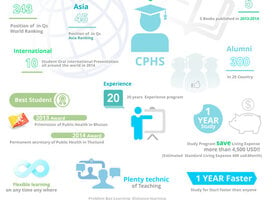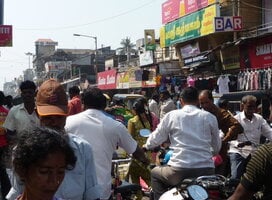Global Health Study Abroad Programs
Global health and health policy is an inherently dynamic, interconnected, and multicultural field. Perhaps more than other areas, students and practitioners directly benefit from time spent working or studying overseas in a way that concretely benefits the rest of their career.
From working effectively with diverse populations and understanding international health issues firsthand to learning how to manage international health crises and implement real healthcare policy, programs that put global health students on the ground are a practical and enriching part of a well-formed course of study.
What do global health professionals do?
Global health practitioners develop, implement, or analyze programs that advance the health of individuals and communities at home and abroad. They work to prevent disease, implement new programs and policies, conduct research, educate, and advocate.
Professionals in this field work in a variety of sectors: governmental, non-governmental, educational, and non-profit. Since healthcare is an essential topic in almost every country around the world, global health workers are in high demand.
How is studying global health different than pre-med?
Fundamentally, the biggest difference is that pre-med students are usually working towards becoming doctors, where as global health students take a much more interdisciplinary approach that bridges many fields like biology, sociology, and public policy. They usually study healthcare from a high-level perspective, where pre-med students focus on implementing care.
As far as going overseas, "study" abroad tends to be much more hands-on than other areas and may be structured more like a service learning program. Pre-med students are more likely to work in hospitals and shadow doctors or nurses. Their focus is usually on direct patient care. Global health students could work in clinics, as well, but could also work in research, policy think tanks, non-profit organization, or management of hospitals and clinics.
Program Topics
There are many sub-topics that fall under the umbrella of global health that the wide range of offerings for study abroad may cover, such as:
Infectious disease. Usually studied in tropical and developing countries, this includes the study of HIV/AIDS, sexually transmitted diseases, diseases like cholera, malaria, and tuberculosis, as well as chronic conditions endemic to a specific population.
Maternal and child health. Many countries face huge numbers of preventable deaths because of the vulnerability of disease to mothers and young children. Intervening at these intervals of life provides critical improvements in nationwide health indices.
Health service systems. Learning how global health experts implement health care infrastructure in developing and industrialized countries. This includes the organization, financing, and management of these systems.
Crisis management. Students can study how global health professionals address the effects of war, displacement, violence, and other forms of political or social trauma that may have health consequences.
What would I really be doing?
Here is a list of just some of the other areas and responsibilities a global health student may be involved in when they go abroad, in the classroom or the field:
- Research
- Microfinance
- Delivering medical services
- Working with medical products
- Community assessments
- Disease prevention
- Educational initiatives
- Reproductive health
- Women and children
- Clinic or hospital administration
For more information, explore this amazingly comprehensive list of fellowships and offerings in the field.
Global health can be studied from absolutely anywhere, at home or overseas. Because of this, there are no shortage of programs or opportunities on any continent for any sub-topic within the field.
The most important question to ask yourself is: are you interest in global health in general or the needs and conditions of a specific country? Many people go into global health in the first place because they have a specific interest in a specific country. Obviously, this would provide a viable direction.
Otherwise, you'll want to look for programs that are topic-driven, like tropical diseases or childcare, and you'll want to travel to the country that provides the best hands-on learning for that area.
To give you some idea of where you could go, the University of Michigan School of Public Health website cites “major research collaborations in Argentina, Brazil, China, Colombia, Ecuador, Ghana, Guatemala, India, and Malawi.” South Africa, Tanzania, and Mexico also seem to be popular.
Europe can also be interesting if you'd like to study global health from a policy or political science, as the continent has arguably the best healthcare systems on the planet with the best results.
Where you go is not as important as who you go overseas with
Many programs are organized by an external provider that develops their own global health curriculum, instead of studying in a classroom at a foreign university like your peers in political science or law may be doing.
This is because a top university in any country is usually not located where the biggest need for public health reform or program implementation is, and because students learn best in the field, tailored program experiences are the answer, especially for rural global health studies.
Choose that provider very carefully as you may wind up in a remote area working in small teams for extended periods of time and your learning is heavily dependent on their model.
For more information, here's another incredible list of providers or relevant organizations.













